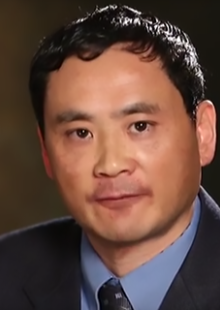
ABOUT
Dr. Zhou begin at Georgia tech in Fall 1995 as an Assistant Professor in Mechanical Engineering. He presently holds a joint appointment with the School of Materials Science and Engineering and Mechanical Engineering. Prior was a Research Fellow at the California Institute of Technology
Dr. Zhou’s research interests concern material behavior over a wide range of length scales. Issues analyzed include effects of microstructure in heterogeneous materials, nanoscale deformation and failure, equivalent continuum (EC) representations of atomistic systems, and fracture. The approaches he uses emphasize both high-performance computational modeling using finite elements and molecular dynamics as well experimental characterization using laser interferometry and novel digital diagnostics. A variety of deformation and loading conditions encountered in engineering applications are considered. Most of the conditions are not typically simulated by routine tests such as simple tension, compression and shear. Under these conditions factors such as loading rate and inertia influence the behavior of engineering materials. Using experiments and analytical approaches that explicitly account for material mesoscopic, microscopic, and nanoscopic structures, his research aims to outline the factors and mechanisms that influence material performance under given conditions. The objective is to provide guidance for the enhancement of performance through material design and synthesis.
PUBLICATIONS & PATENTS
- M. Zhou, A New Look at the Atomic Level Virial Stress - On Continuum-Molecular System Equivalence, Proceedings of the Royal Society of London A,459, 2347-2392, 2003;
- A. R. Keller and M. Zhou, Effect of Microstructure on Dynamic Failure Resistance of TiB2/Al2O3 Ceramics, Journal of the American Ceramic Society, 86 (3), 449-457, 2003;
- M. Zhou and D. L. McDowell, Equivalent Continuum for Dynamically Deforming Atomistic Particle Systems, Philosophical Magazine A, 82(13), 2547-2574, 2002;
- D. L. Grote, S. W. Park, and M. Zhou, Experimental Characterization of the Dynamic Failure Behavior of Mortar under Impact Loading, Journal of Applied Physics, 89(4), 2115-2123, 2001;
- J. Zhai and M. Zhou, “Finite Element Analysis of Micromechanical Failure Modes in Heterogeneous Brittle Solids”, International Journal of Fracture, 101, 161-180, 2000;
- K. Minnaar and M. Zhou, A Novel Technique for Time-Resolved Detection and Tracking of Interfacial Fracture in Layered Materials, Journal of the Mechanics and Physics of Solids, 52 (12), 2771-2799, 2004;
- W. Liang and M. Zhou, Response of Cu Nanowires in Dynamic Tensile Deformation, Journal of Mechanical Engineering Science, 218(6), 599-606, 2004;
- V. Tomar, J. Zhai and M. Zhou, Bounds for Element Size in a Variable Stiffness Cohesive Finite Element Model, International Journal for Numerical Methods in Engineering, 61, 1894-1920, 2004;
- J. Zhai, V. Tomar and M. Zhou, Micromechanical Simulation of Dynamic Fracture Using the Cohesive Finite Element Method, Journal of Engineering Materials and Technology, 126, 179-191, 2004;
- M. Zhou, A. J. Rosakis and G. Ravichandran, "Dynamically Propagating Shear Bands in Impact-loaded Prenotched plates, I - Experimental Investigations of Temperature Signatures and Propagation Speed", II - Numerical Simulations, Journal of the Mechanics and Physics of Solids, 44, 981-1032, 1996.
EDUCATION & AWARDS
- Ph.D., Brown University, 1993
- Sc.M., Brown University, 1990
- M.S., Beijing University of Aeronautics and Astronautics, 1985
- B.S., Taiyuan Heavy Machinery Institute, China, 1982
- American Society of Mechanical Engineers Fellow, 2005
- Woodruff School Faculty Fellow, 2004-2008
- Sigma Xi Georgia Tech Chapter Best Paper Award, 2004
- Journal of Engineering Materials and Technology Associate Editor, 2001-present
- National Science Foundation Faculty Early Career Award, 2000-2005
RESEARCH INTERESTS
- Biologically Enabled and Bioinspired Materials
- Nanomaterials and Nanoengineered Devices
- Computational Design, Modeling, and Simulations
- Energy Storage and Harvesting
- Advanced Structural Materials
- Micro- and nano-scale behavior
- Continuum and molecular dynamics modeling
- Dynamic response
- Experimental mechanics
Research
Dr. Zhou’s recent research characterized the dynamic shear failure resistance of structural metals and demonstrated the important role of microscopic damage in influencing failure processes through shear banding. Using a novel micromechanical model, he pointed out several microstructural adjustments that may improve the performance of a class of metal matrix composites in applications in which dynamic shear banding plays an important role. Using a micromechanical approach that explicitly accounts for random microstructures as well as random crack and microcrack development in heterogeneous materials, his research pointed out microstructural characteristics that significantly influence the fracture toughness of a system of ceramic composites. His latest contributions include the development of an equivalent continuum (EC) theoretical framework for linking molecular dynamics and continuum mechanics. Dr. Zhou has an intermediate-to-high strain rate material research facility which includes a split Hopkinson pressure bar apparatus, a tension bar apparatus, and a combined torsion-tension/torsion-compression bar apparatus.
His current research projects include the deformation and failure behavior of metallic nanowires, sponsored by NASA; multifunctional energetic materials, sponsored by the Air Force Office of Scientific Research; microstructure-induced Toughening in advanced ceramic composites with multiple micro- and nano-size scales; sponsored by the National Science Foundation; and impact damage and residual strength of structural composites, sponsored by the Office of Naval Research.